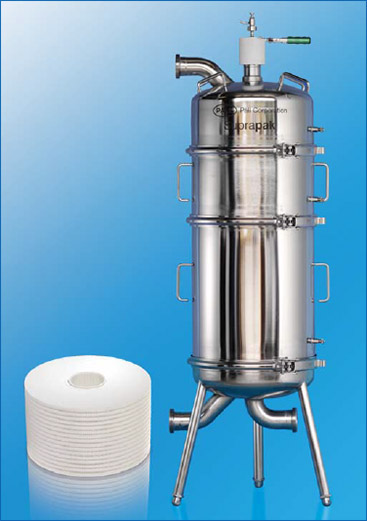
How to increase capacity and improve whisky consistency by replacing flat sheet filtration
May, 2023
SUPRApak™ Technology in Canadian Whisky Production is Demonstrably Superior to Flat Sheet Filtration
Thanks to a combination of western culture adoption in developing countries and the increase in whisky as an essential cocktail ingredient, the whisky industry is enjoying steady growth. Statista.com reports that the global whiskey market will grow 33% by 2025 to $79.6 billion. This growth, along with increased consumer demand for premium and varied products, is fueling the need for producers to increase productivity or expand while maintaining or improving quality standards.
Creating a Superior Whisky
Whisky is distilled from a mash of fermented grains, including barley, corn, rye and/or wheat. Whisky producers apply expert and proprietary techniques for the creation of their unique brands. Particle removal and haze filtration are indispensable steps in production, common but essential to achieving quality specifications.
Historically, sheet filter presses are used in these applications. With the excellent capability to achieve depth filtration and adsorption, filter sheets are an ideal solution for turbidity reduction and haze removal in distilled spirits. However, sheet filters in a press configuration pose several challenges:
- labor-intensive handling and filter change-out
- high hold-up volumes which negatively affect yield on product changes
- drip losses resulting in lower yields or the need for reprocessing.
Additional drawbacks are large footprint, and relatively high capital investment. Finally, sheet filters are open systems. This can result in volatile organic compounds escaping to the surrounding environment and must often be exhausted via area ventilation systems, to avoid air quality and safety concerns.
Pall’s SUPRApak technology has a proven track record in brown spirits production. Its primary application with demonstrated benefits is in the replacement of traditional flat filter sheets for particle and/or haze removal, resulting in quality improvement, capacity expansion, and cost of ownership reduction.
The Challenge
A large distillery produces several million liters of different brands of Canadian whisky. To increase their capacity within their plant, they needed to increase productivity as demand for contract bottling projects increased. This target must be accomplished while achieving consistent quality and reducing production complexity.
The distillery was using a 60 cm x 60 cm sheet filter with a filtration area of 19.7 m2 (212 ft2), resulting in flux rates of 749-1153 liters/m2-hour. The filter sheet grade in use was relatively tight, to meet the filtrate quality specification of less than 1 NTU.
Due to sheet blocking and differential pressure build-up, filter sheets were sometimes changed mid-batch or at varying points during the filtration process with batch sizes of 30,283 liters (8,000 US gallons). Some batches were filtered once, while others required two or more passes through the sheet filter to achieve the required result. The process discrepancies and the tightness of the filter grade caused the color of the filtered whisky to be inconsistent. Depending on how long the sheets had been in production, they were at varying stages of saturation. As a result, the product blending sometimes had to be adjusted to mask variation. Process consistency was a struggle with the existing setup, and labor and time expenditure for managing the sheet filter further limited productivity.
The Solution
SUPRApak technology is a closed system alternative to sheet filtration for distilled spirits production. Due to their unique edge flow technology, SUPRApak SH modules achieve a better filtration effect than a similar grade of filter sheets. They remove components responsible for particulate and colloidal haze formation with minimal color adsorption. The result is a visually clear product, which meets producers’ organoleptic profile requirements.
During a full-scale trial at the distillery, SUPRApak performed as expected. It took one SUPRApak SH7200LW module less than half the surface area of the 19.7 m2 sheet filter assembly to process a batch of 30,283 liters (8000 gallons). Besides a substantially higher throughput, the SUPRApak solution consistently surpassed the filtrate quality specification after just a single pass through the module, achieving 0.4 NTU without a negative impact on color. Trial results demonstrated the optimum sizing for purposes of specifying a production-sized installation.
Single-pass filtration and relatively infrequent change-outs are achieved by conservative sizing. Continuous operation keeps the cost per filtered volume low and minimizes product losses. Several batches run consecutively without modules needing to be replaced. After installation of new, unused modules, fluid is recirculated for 5 minutes to ensure uniform saturation. Inconsistencies in color no longer pose a problem and the need for blending has been eliminated.
Each manufacturing cell is sized to handle 50% higher flow than the previous sheet filter installation. Together the 3 manufacturing cells process 3 different batches concurrently in 4 hours, whereas previously it took an average of 8 hours to complete one batch. In effect, capacity has increased by 6 times. The footprint in each cell requires about 66% of the space required by the sheet filter.
Due to the substantial operating cost reduction realized, payback for the capital investment in filter housings was achieved in less than 10 months.
With SUPRApak modules, the whisky producer achieved cost-effective and quality-enhancing filtration. Due to the substantial operating cost reduction realized, payback for the capital investment in filter housings was achieved in less than 10 months.
To download the full bulletin, complete the form below and submit
- Category
- Author
- Sort By





